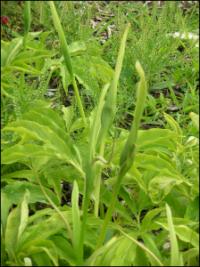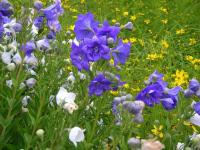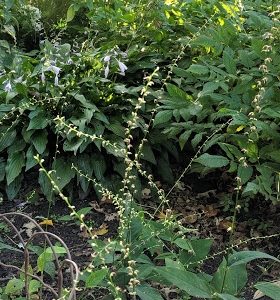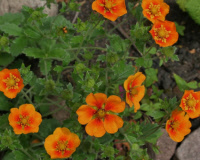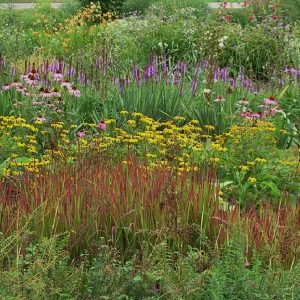Archives
Showing 137–144 of 199 results
-
Pinellia pedatisecta Green dragon Z 5-8
Green modified leaf (spath) curls around very thin, tall, graceful inflorescence (spadix) much like a primitive jack-in-the-pulpit. Grow this & hear your friends ask "what is that?"
ARCHIVED
Note: This is a plant not currently for sale. This is an archive page preserved for informational use.
Green modified leaf (spath) curls around very thin, tall, graceful inflorescence (spadix) much like a primitive jack-in-the-pulpit. Grow this & hear your friends ask “what is that?”
Size: 18" x 8"
Care: easy to grow in sun to part shade in moist to moist well-drained soil
Native: N & W ChinaIn Chinese called “Hu Zhang.” In Chinese medicine used to remedy ailments of the spleen, gallstones & coughs. Raw plant is toxic but neutralized by drying. Collected for western gardens by 1858.
-
Platycodon grandiflorus double Double Balloon flower Z 3-9
Balloon shaped buds opening to double blue bells from mid-summer to early fall. Deadhead for rebloom.
ARCHIVED
Note: This is a plant not currently for sale. This is an archive page preserved for informational use.
Balloon shaped buds opening to double blue bells from mid-summer to early fall. Deadhead for rebloom.
Size: 24” x 12”
Care: Full sun to part shade in moist well-drained soil, Heat and drought tolerant.
Native: Eastern Asia
Wildlife Value: attracts bees & butterfliesPlatycodon is Greek from platys meaning “broad” and kodon meaning “bell”, referring to the shape of the flower. Cultivated in China for hundreds of years where it is called Jie-geng. The Chinese used the root boiled to cure a chill in the stomach. Mentioned in Man’yoshu, a Japanese anthology of poems written in the 8th century. German botanist Johann Gmelin first discovered P. grandiflorus in Siberia in 1754. Gmelin’s Siberian mission, sponsored by Catherine the Great, took 10 years and nearly killed him. Gmelin introduced it to European garden cultivation by 1782. The double form since 1800’s.
-
Pollia japonica Z 5-8 Yabumyooga in Japanese
Whorls of white flowers on a stalk above foliage blooming in July-August turn to blue berries in fall, oblong, foot-long, shiny foliage resembling ginger leaves.
ARCHIVED
Note: This is a plant not currently for sale. This is an archive page preserved for informational use.
Whorls of white flowers on a stalk above foliage blooming in July-August turn to blue berries in fall, oblong, foot-long, shiny foliage resembling ginger leaves.
Size: 1-3’ x 1-3’ spreads by rhizomes
Care: part to full shade in medium to moist soil
Native: Forests in China, Taiwan, Korea and JapanCollected by Thunberg by 1784. Used medicinally in Asia to treat colds and vertigo.
-
Polygonum virginianum syn. Persicaria virginiana Jumpseed Z 4-8
Arresting tiny white flowers atop nearly leafless stems blooming late summer into fall; dark green foliage marked with a maroon chevron on each leaf
ARCHIVED
Note: This is a plant not currently for sale. This is an archive page preserved for informational use.
Arresting tiny white flowers atop nearly leafless stems blooming late summer into fall;
dark green foliage marked with a maroon chevron on each leafSize: 2-3’ x 3-4’
Care: shade to part shade in moist to moist well-drained soil
Native: All eastern areas from central Canada south to Texas, Wisconsin native
Wildlife Value: attracts birds, bees & butterflies, Deer resistant
Size: Cherokee made a hot infusion of leaves with the bark of a Honey Locust to treat whooping cough.Linnaeus 1753.
-
Potentilla argyrophylla Cinquefoil Z 5-8
Sunshine colored saucers with orange centers in early summer
ARCHIVED
Note: This is a plant not currently for sale. This is an archive page preserved for informational use.
Sunshine colored saucers with orange centers in early summer
Size: 24” x 24”
Care: sun in well-drained soil
Native: Nepal, China, Pakistan & AfghanastanPotentilla is Latin meaning powerful referring to medicinal properties. Argyrophylla means silver leaved. Potentillas used by dentists in the 16th century to reduce pain according to Gerard, English herbalist. Per Culpepper, 17th century English herbalist potentilla is to be used if Jupiter is ascending and the moon is “applying to him.” This species collected by 1831.
-
Potentilla hippiana Woody cinquefoil Z 4-8
Small clusters of yellow flowers atop fuzzy, toothed edged leaves
ARCHIVED
Note: This is a plant not currently for sale. This is an archive page preserved for informational use.
Small clusters of yellow flowers, July-August, atop fuzzy, toothed edged leaves
Size: 5-20” x 12"
Care: full sun in well-drained to moist well-drained soil
Native: Central & Southeast USA & much of Canada
Wildlife Value: Bee plantJohann Georg Lehmann (1792-1860) named this species in 1827 from a specimen collected by Edwin James in 1820 near the “sources of the Platte”. Carl Hippio was, in Weber’s words, “a revered colleague of Lehmann”
-
Prairie Garden
Prairie Garden
ARCHIVED
Note: This collection is not currently for sale. This is an archive page preserved for informational use.
Prairie Garden Size : Height x width* Bloom color
3 Agastache foeniculum – Anise hyssop 2-3’ x 12” purple
3 Allium cernuum – Prairie onion 12”-18”x 3-6” pink
1 Aster cordifolius – Blue wood aster 2-3’ x 2-3’ blue
3 Bouteloua gracilis – Blue grama 2’ x 12” purple tinge
1 Desmanthus illinoensis – Prairie mimosa 4’ x 3’ white
1 Eryngium yuccifolium – Rattlesnake master 48” x 18” white
1 Eupatorium sessilifolium – Upland boneset 3-4’ x 12-24” white
1 Euphorbia corollata – Flowering spurge 36”x 18” white
3 Geum triflorum – Prairie smoke 12”x 8” pink
1 Hystrix patula – Bottlebrush grass 2-3’ x 12-18” purple/green
1 Monarda fistulosa – Beebalm 3-4’ x 2’ purple
1 Parthenium integrifolium – Wild quinine 2-3’x 12” white
1 Solidago riddellii – Riddell’s goldenrod 3’ x 2’ yellow
3 Sporobolis heterolepsis – Prairie dropseed 2’ x 2’ orange-copper
All plants are perennials.
If planted together in one garden these make a 32 square foot garden. *Most of these plants get wider over time by spreading roots or by self-seeding . -
Primula vulgaris syn. Primula acaulis English primrose Z 4-8
Primrose yellow blossoms in earliest of spring.
ARCHIVED
Note: This is a plant not currently for sale. This is an archive page preserved for informational use.
Primrose yellow blossoms cheer on the earliest of spring.
Size: 6" x 6"
Care: shade in moist to moist well-drained soil. Immune to Walnut toxicity
Native: Europe
Awards: Received England’s Royal Horticultural Society Award of Merit.Primula is from Italian “primavera” meaning first spring. Vulgaris means common. Grown in the Eichstätt Garden, the garden of Johann Konrad von Gemmingen, prince bishop of Eichstätt in Bavaria, c. 1600. Grown by Jefferson. Grown at America’s 1st botanic garden, Elgin Botanic Garden 1811. Old medicinal uses to cure gout and headaches.

